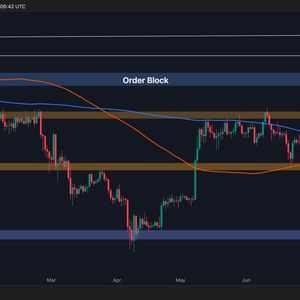Privacy Pools Unveils Revolutionary Support for USDS Stablecoin: Enhanced On-Chain Privacy
5 min read
BitcoinWorld Privacy Pools Unveils Revolutionary Support for USDS Stablecoin: Enhanced On-Chain Privacy In the rapidly evolving world of digital finance, the quest for privacy remains a paramount concern for many. While blockchain technology offers transparency, it also exposes financial activities to an unprecedented degree. This is where innovations like Privacy Pools step in, offering a crucial layer of confidentiality. The crypto community is buzzing with the news that Privacy Pools, the innovative on-chain privacy solution, is now officially supporting Sky’s USDS stablecoin. This development marks a significant stride towards enhancing financial privacy in the decentralized ecosystem, especially for those utilizing stablecoins. Privacy Pools: Pioneering On-Chain Privacy, What Is It? At its core, Privacy Pools is designed to bring much-needed anonymity to blockchain transactions. Think of it as a digital mixing service, but with a crucial distinction: it leverages zero-knowledge proofs (ZKPs) to allow users to prove they own funds without revealing the specific source of those funds. This technology is a game-changer for on-chain privacy , enabling users to break the traceable link between their deposited and withdrawn funds. The project has garnered considerable attention, not least because it is backed by none other than Ethereum co-founder Vitalik Buterin , whose endorsement signals the project’s technical robustness and ethical alignment with core blockchain principles. The mechanism works by allowing users to deposit funds into a common ‘pool.’ When they withdraw, the system uses ZKPs to verify that the withdrawn funds correspond to a legitimate deposit, without revealing which specific deposit it was. This creates an anonymity set, making it incredibly difficult to trace transactions back to their origin. For individuals and entities alike, this means: Enhanced Fungibility: Every unit of a cryptocurrency becomes indistinguishable from another, just like physical cash. Protection Against Surveillance: It helps prevent unwanted tracking of spending habits or financial associations. Increased Security: By obscuring transaction patterns, it adds a layer of security against targeted attacks. The Strategic Move: Integrating USDS Stablecoin The integration of Sky’s USDS stablecoin into Privacy Pools is a monumental step. Stablecoins, designed to maintain a stable value, are the backbone of many decentralized finance (DeFi) activities. They are used for trading, lending, borrowing, and payments, making their transaction histories particularly sensitive. Until now, stablecoin transactions on public blockchains have been entirely transparent, revealing balances, spending patterns, and even who interacts with whom. This level of transparency, while inherent to blockchain, poses significant privacy risks for users. By bringing USDS into the Privacy Pools ecosystem, users can now conduct transactions with this stablecoin with a much higher degree of privacy. This means: Private Payments: Businesses and individuals can make and receive payments without revealing their entire transaction history. Confidential DeFi Engagements: Participation in lending protocols, liquidity provision, or yield farming can be done with greater anonymity. Reduced Data Leakage: Protects users from having their financial activities scrutinized by third parties, whether for marketing, regulatory, or malicious purposes. This move is not just about one stablecoin; it sets a precedent for how other stablecoins might integrate privacy features, fundamentally changing the landscape of private digital transactions. What Does This Mean for Cryptocurrency Privacy as a Whole? The support for USDS by Privacy Pools is a significant indicator of the growing demand and technological feasibility for enhanced cryptocurrency privacy across the board. For too long, the trade-off between blockchain transparency and user privacy has been a contentious issue. Solutions like Privacy Pools are bridging this gap, demonstrating that it is possible to maintain the integrity and verifiability of blockchain while offering users the confidentiality they desire. This development sends a strong signal to the broader crypto industry: privacy is no longer a niche concern but a fundamental requirement for mainstream adoption. As more assets become compatible with privacy-enhancing protocols, the entire ecosystem benefits from increased fungibility and reduced vulnerability to financial surveillance. It empowers users with greater control over their financial data, aligning with the core ethos of decentralization and individual sovereignty. Vitalik Buterin’s Vision: The Backing Behind Privacy Innovation The involvement and endorsement of Vitalik Buterin cannot be overstated. As a co-founder of Ethereum and a leading voice in the blockchain space, Buterin has consistently advocated for privacy as a critical component for the long-term success and ethical development of decentralized systems. His support for Privacy Pools underscores the project’s legitimacy and its alignment with the foundational principles of a truly decentralized and user-centric internet. Buterin’s insights often shape the direction of the blockchain industry, and his emphasis on privacy highlights its importance for preventing censorship, ensuring economic freedom, and fostering a more equitable digital future. His backing provides a powerful stamp of approval, attracting talent, resources, and further attention to the critical work being done by Privacy Pools. It’s a clear signal that privacy solutions are not just theoretical concepts but practical necessities for the evolving digital economy. Addressing Challenges and Looking Ahead: The Future of Private Digital Transactions While the integration of USDS is a major win, the path to widespread on-chain privacy is not without its challenges. Regulatory scrutiny remains a significant hurdle, as governments worldwide grapple with how to balance privacy with anti-money laundering (AML) and counter-terrorism financing (CTF) concerns. Projects like Privacy Pools must navigate these complex legal landscapes, ensuring compliance while still delivering robust privacy features. However, the project’s stated plans to expand into multi-asset Privacy Pools indicate a clear vision for the future. This expansion would allow a broader range of cryptocurrencies and tokens to benefit from the same privacy guarantees currently extended to USDS. Imagine a future where any digital asset can be transacted with a strong layer of confidentiality, making the entire blockchain ecosystem more resilient and user-friendly. This forward-looking approach suggests a commitment to making privacy a default feature, rather than an add-on, for digital assets. For users, this development means exploring options for more private stablecoin transactions. It’s an invitation to engage with protocols that prioritize user confidentiality and contribute to a more private digital economy. Conclusion: A New Era for Private Digital Assets The integration of Sky’s USDS stablecoin into Privacy Pools represents a pivotal moment for cryptocurrency privacy . Backed by the visionary Vitalik Buterin , this move not only enhances the utility of USDS but also sets a powerful precedent for the entire stablecoin market and the broader quest for on-chain privacy . As Privacy Pools continues its expansion into multi-asset support, we are witnessing the dawn of a new era where financial confidentiality on the blockchain becomes more accessible and robust. This development is a testament to the ongoing innovation within the crypto space, continually striving to balance transparency with the fundamental human right to privacy. To learn more about the latest crypto market trends, explore our article on key developments shaping cryptocurrency privacy and institutional adoption. This post Privacy Pools Unveils Revolutionary Support for USDS Stablecoin: Enhanced On-Chain Privacy first appeared on BitcoinWorld and is written by Editorial Team

Source: Bitcoin World


